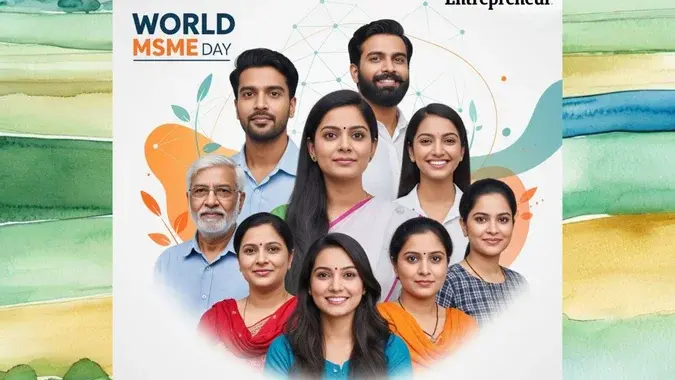- Home
- News Press Releases
- The Micro, Small, and Mighty: MSME Day 2025
The Micro, Small, and Mighty: MSME Day 2025

As India marks MSME Day 2025, the country finds itself at a critical juncture. With over 7.4 crore micro, small and medium enterprises (MSMEs) accounting for nearly 30 per cent of GDP, 45.7 per cent of exports, and employing over 20 crore people, the sector is undeniably the backbone of the Indian economy. The emergence of Industry 5.0 marks a new chapter for India's MSMEs, where the fusion of human creativity and intelligent machines could redefine manufacturing, services, and even artisanal sectors.
But despite its scale and contribution, MSMEs face a complex matrix of challenges such as – limited access to finance, outdated technology, skill gaps, and infrastructure bottlenecks. Yet, a quiet transformation is underway, powered by digital tools, policy support, and a growing recognition that innovation must be inclusive if India is to realise its vision of becoming a $5 trillion economy.
Levelling the Playing Field
Vinod Kumar, partner & leader - manufacturing at PwC India, highlights this inflection point: "India's MSME sector is undergoing a pivotal transformation, with technology emerging as a key enabler of competitiveness and scalability." For Kumar, MSMEs are increasingly adopting digital tools such as cloud-based ERP systems, e-commerce platforms, digital payments, and AI-powered analytics—to streamline operations, access broader markets, and enhance productivity. "Whether in precision engineering, healthcare devices, or agri-tech," he says, "the integration of smart technologies with human creativity is unlocking new possibilities."
This momentum is mirrored in the numbers. According to a SME Digital Insights Study, over half of SMEs in India now use public cloud infrastructure, and one in five has migrated more than 50 per cent of their workload to the cloud. Cloud-powered tools like ERP and CRM systems are helping integrate business functions, streamline operations, and promote remote collaboration—without the need for large IT teams or capital-heavy infrastructure.
Technology Alone Isn't Enough
But if technology is the fuel, people are still the engine. For many MSMEs, especially those in rural or legacy sectors, the gap in digital literacy remains a major hurdle. Kinra notes that while adoption is growing, challenges such as limited digital skills, cybersecurity risks, and fragmented implementation still hinder full-scale transformation. "Technology adoption alone is not enough—businesses also need the right skill sets and strategic guidance to maximise their digital investments," he says.
The government, too, has tried to bridge these divides with targeted schemes like Udyam Registration, Emergency Credit Line Guarantee Scheme (ECLGS), and the Production-Linked Incentive (PLI) scheme. These are designed to streamline compliance, improve credit flow, and support tech adoption.
Yet, as Lajpat Yadav, COO at Ador Welding Ltd., puts it, "Disparities persist, such as limited access to capital, poor access to technology, and limited accessibility to the formal marketplace." He argues that structured financial practices, disciplined budgeting, and stronger financial literacy are equally essential for long-term sustainability.
Platforms, Policy, and Partnerships
Some firms are taking this message seriously. Ketan Kulkarni, MD & CEO of AllcargoGATI, points out that, "Platforms like ONDC, Amazon, and Flipkart allow MSMEs to bypass traditional distribution channels and connect directly with customers." The stakeholders need to be focused on bolstering MSME clusters across India, providing end-to-end supply chain solutions that allow them to grow beyond hometown constraints.
Yet, it's not just about commerce. Vasu Naren, CMD of Sona Machinery Ltd., reminds us that the government still needs to step it up. "The government needs to lay special emphasis on investing in Research and Development (R&D), refining quality control processes, and developing innovation ecosystems in order to improve MSME competitiveness."
To match global standards, Naren believes India must invest more to improve quality control processes and reduce the skill gap with technology training. "AI will change the world and so will it change the MSME industry," he says, "and all workers, owners, stakeholders must be well prepared for it."
This call for a broader support ecosystem is echoed by Rajneesh Kumar, senior vice president and chief corporate affairs officer, Flipkart Group, who says that, "With strategic collaborations like Walmart Vriddhi, we are collectively enabling entrepreneurs to scale their aspirations and significantly contribute to India's burgeoning digital economy." Similarly, Jason Fremstad, SVP at Walmart, underscores the importance of equipping entrepreneurs with the business skills and market access needed to thrive in a digital economy. "Many micro enterprises face difficulties in securing the knowledge, tools and market access they need," he says. "Empowering these entrepreneurs has helped them to build and scale their business sustainably."
Ready for the Future
At a broader level, India's MSME sector remains hampered by regulatory complexity, low productivity in traditional industries, and insufficient integration into global value chains. Experts suggest a systemic, policy-driven approach is needed; one that combines infrastructure development, digital upskilling, simplified compliance, and access to formal credit markets.
Pankaj Gupta, MD & CEO, Godrej Finance sums it up perfectly, "Many MSMEs don't lack ambition, they lack access, clarity, and confidence. They need support in understanding compliance, unlocking working capital, and going digital without getting overwhelmed."
The story of India's MSMEs is far from over. Their future will be shaped not only by how well they adopt new technologies but also by how inclusively they grow, how strategically they invest, and how sustainably they operate. As India looks ahead to 2047 and the vision of a developed, self-reliant nation, the role of MSMEs will be nothing short of decisive.

